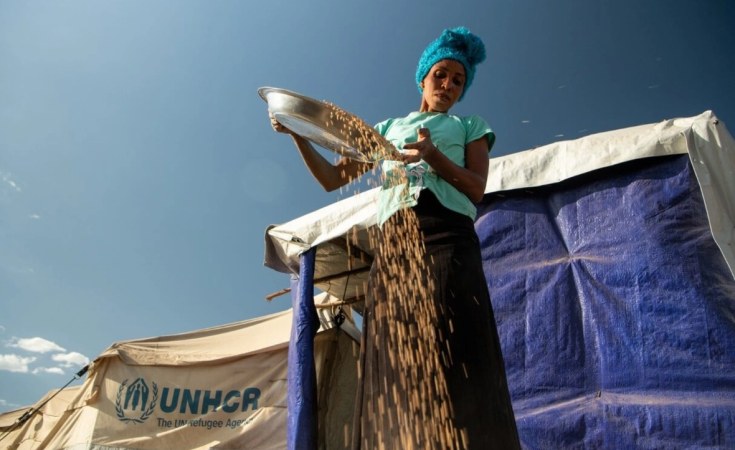On 20 March, UNHCR, the UN Refugee Agency in Ethiopia, the Government of Ethiopia's Refugees and Returnees Service (RRS) and over 130 partners, including UN agencies, government ministries, national and international NGOs, refugees, and the private sector, came together to sound the alarm on the unprecedented funding crisis jeopardizing assistance to nearly 1 million refugees in the country.
Under the banner of "Together with Refugees" Partners' Conference, humanitarian and development partners urged for increased donor support to bolster the response and provide much-needed assistance to those in greatest need. The discussions also paved the way to this year's Refugee Response Plan, which is yet to be launched.
Ms. Teyiba Hassen, RRS Director General, expressed deep concern over the impact of underfunding for refugees stating, "it is disheartening to witness the impact of underfunding on refugees because the level of needs far outweighs the resources available," She added "international support is crucial to enable the government to continue to make good on our commitment to continue hosting refugees and asylum seekers."
The educations sector is one of the hardest hit, with only half of school-aged refugee children in the country currently attending school. Overcrowded classrooms and up to 80 percent of children drop out of school after their primary education compounded the challenges. Without additional funding, salaries for most primary and secondary education teachers will go unpaid, leading to the closure of schools in 23 refugee locations in the country. Furthermore, lack of essential medicines and medical equipment continue to hamper partners' abilities to prevent and respond to disease outbreaks, resulting in twice as many preventable deaths among refugees in 2023.
"It is evident that the shortage of funding is already worsening refugees' lives despite their ever-increasing needs and the host communities who are generously hosting them need additional support as well," said Andrew Mbogori, UNHCR's Representative in Ethiopia. "Our commitment to working together in partnership, in the spirit of international solidarity and cooperation is unwavering. But without reliable funding, UNHCR, RRS and partners will not be able to provide lifesaving assistance to refugees and will be hindered from ensuring refugees and host communities access basic services and socio-economic opportunities, so to advance solutions from the start" added Mbogori.
"It is time we act. We know the problems, we have a strong partnership with the government and civil society, and we are committed to finding durable solutions. But without resources, we cannot do much," said Dr. Ramiz Alakbarov, the UN Resident and Humanitarian Coordinator in Ethiopia.
Most importantly, refugees themselves shared how gaps in healthcare, education and water provisions are directly affecting their lives.
"Since the teachers are not receiving adequate salaries, they don't always teach at school. Gatchew, a 23-year-old student in Gambella lamented "when the teachers don't come, students also miss out on school and engage in other activities."
"The hospital here does not have medicine, so we have to pay expensive transport fees to travel far way to get medication or even sell our food to be able to afford medicine for our children," said Hinda, a Somali refugee in Mirqaan refugee settlement.
Insufficient funding has also left those fleeing conflict in Sudan with limited access to clean water, putting them vulnerable to diseases.
"Because of shortage of clean water at the site, we often must collect dirty water from a distant river that even harbors worms. Because the water is not safe for drinking, children are suffering from many health diseases like diarrhea," said Rufaidah, a Sudanese refugee staying in Kurmuk transit center, Benishangul Gumuz region.
With over 1 million refugees and asylum seekers residing in Ethiopia, the country stands the third largest refugee host in Africa. More than 50,000 people who have fled the conflict in Sudan have found refuge in its borders. UNHCR continues to appeal for donor support to improve living conditions for refugees, investments to provide national services and bolster community resilience, as well as peaceful co-existence with the host community.


